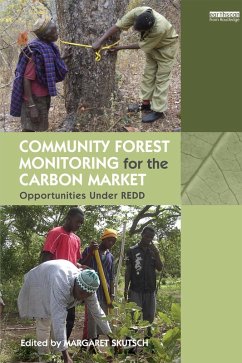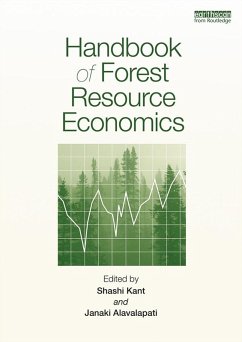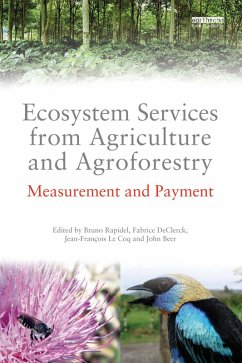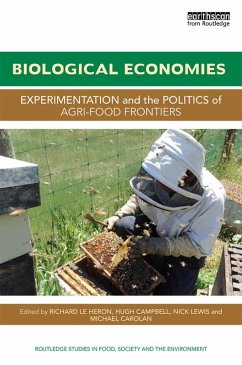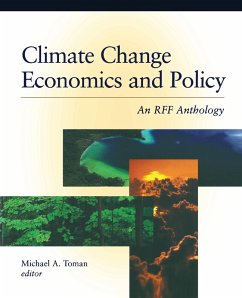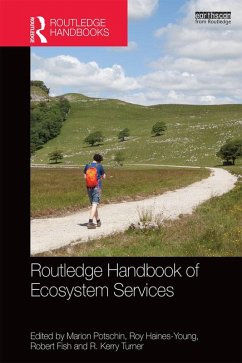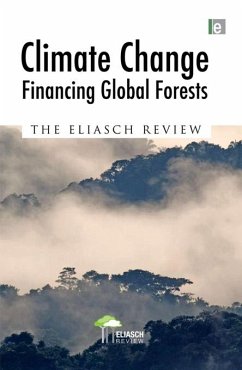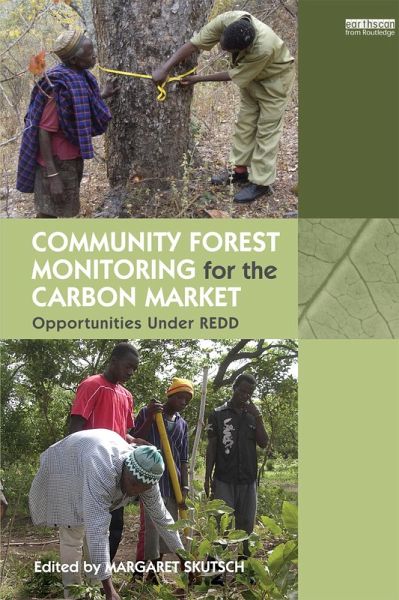
Community Forest Monitoring for the Carbon Market (eBook, ePUB)
Opportunities Under REDD
Redaktion: Skutsch, Margaret
Versandkostenfrei!
Sofort per Download lieferbar
45,95 €
inkl. MwSt.
Weitere Ausgaben:

PAYBACK Punkte
23 °P sammeln!
Recent developments in international policy on Reduced Emissions from Deforestation in Developing countries (REDD) open the way for crediting of carbon saved by rural communities through management of the forests in their vicinity. Since the annual changes in forest carbon stock under this kind of management are relatively small and often under the canopy, they cannot easily be assessed using remote sensing, so ground-level data collection is likely to be essential over large areas of forests.The potential role of communities in measuring, monitoring and reporting carbon stock changes in their...
Recent developments in international policy on Reduced Emissions from Deforestation in Developing countries (REDD) open the way for crediting of carbon saved by rural communities through management of the forests in their vicinity. Since the annual changes in forest carbon stock under this kind of management are relatively small and often under the canopy, they cannot easily be assessed using remote sensing, so ground-level data collection is likely to be essential over large areas of forests.
The potential role of communities in measuring, monitoring and reporting carbon stock changes in their forests has been explicitly mentioned in UNFCCC documentation on methodology for REDD+, the extended form of REDD that includes forest enhancement, sustainable forest management and forest conservation. This book presents practical methods by which communities can do it. These methods were developed and tested with communities in villages in Africa and Asia under a six-year research programme. The reliability of the data gathered by the community is shown to be equivalent to that of professional forest inventories while the costs are much lower. Involvement of local communities in collection of this data may be the most cost-effective solution for national REDD+ programmes. Moreover, it could provide the basis for a transparent system for distribution of the financial rewards from REDD+ and the carbon market.
The book first presents the policy context, concepts, methods and general results, which include estimates of typical carbon savings resulting from community management in different types of tropical forests. It also looks at the governance issues that may be involved and a variety of ways in which incentive schemes might be designed to encourage communities to participate. The second half of the book is devoted to case studies from the countries involved in the research. These provide both ideas and practical experience to enable agencies to engage with local communities to monitor carbon stock changes.
The potential role of communities in measuring, monitoring and reporting carbon stock changes in their forests has been explicitly mentioned in UNFCCC documentation on methodology for REDD+, the extended form of REDD that includes forest enhancement, sustainable forest management and forest conservation. This book presents practical methods by which communities can do it. These methods were developed and tested with communities in villages in Africa and Asia under a six-year research programme. The reliability of the data gathered by the community is shown to be equivalent to that of professional forest inventories while the costs are much lower. Involvement of local communities in collection of this data may be the most cost-effective solution for national REDD+ programmes. Moreover, it could provide the basis for a transparent system for distribution of the financial rewards from REDD+ and the carbon market.
The book first presents the policy context, concepts, methods and general results, which include estimates of typical carbon savings resulting from community management in different types of tropical forests. It also looks at the governance issues that may be involved and a variety of ways in which incentive schemes might be designed to encourage communities to participate. The second half of the book is devoted to case studies from the countries involved in the research. These provide both ideas and practical experience to enable agencies to engage with local communities to monitor carbon stock changes.
Dieser Download kann aus rechtlichen Gründen nur mit Rechnungsadresse in A, B, BG, CY, CZ, D, DK, EW, E, FIN, F, GR, HR, H, IRL, I, LT, L, LR, M, NL, PL, P, R, S, SLO, SK ausgeliefert werden.




